| Article ID | Journal | Published Year | Pages | File Type |
|---|---|---|---|---|
| 5501825 | Free Radical Biology and Medicine | 2017 | 14 Pages |
Abstract
Oxidative stress is associated with a growing number of diseases that span from cancer to neurodegeneration. Most oxidatively induced DNA base lesions are repaired by the base excision repair (BER) pathway which involves the action of various DNA glycosylases. There are numerous genome wide studies attempting to associate single-nucleotide polymorphisms (SNPs) with predispositions to various types of disease; often, these common variants do not have significant alterations in their biochemical function and do not exhibit a convincing phenotype. Nevertheless several lines of evidence indicate that SNPs in DNA repair genes may modulate DNA repair capacity and contribute to risk of disease. This overview provides a convincing picture that SNPs of DNA glycosylases that remove oxidatively generated DNA lesions are susceptibility factors for a wide disease spectrum that includes besides cancer (particularly lung, breast and gastrointestinal tract), cochlear/ocular disorders, myocardial infarction and neurodegenerative disorders which can be all grouped under the umbrella of oxidative stress-related pathologies.
Related Topics
Life Sciences
Biochemistry, Genetics and Molecular Biology
Ageing
Authors
Mariarosaria D'Errico, Eleonora Parlanti, Barbara Pascucci, Paola Fortini, Sara Baccarini, Valeria Simonelli, Eugenia Dogliotti,
